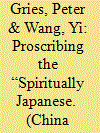| Srl | Item |
| 1 |
ID:
189975


|
|
|
|
|
| Summary/Abstract |
This study has two research objectives. The first is to analyse a case of Chinese ‘cybernationalist authoritarianism’, which I define as the ideological articulation and practical conjoining of cybernationalism and digital authoritarianism. This intriguing case involves the peer production of a virtual celebrity called ‘Oppa China’ (阿中哥哥) by fangirls (饭圈女孩) in China. The empirical analysis contributes to ongoing debates on whether cybernationalists mainly serve or undermine authoritarianism in China. My second objective is to theoretically explore the rising phenomenon of cybernationalist authoritarianism. This exploration contributes to studies on the contemporary transformation of nationalism and authoritarianism. I approach the two objectives by analysing cybernationalist authoritarianism in terms of the interplay between cybernationalism and digital authoritarianism. I find that peer production is the key novel characteristic of cybernationalism and that authoritarian legitimation is the main imperative of digital authoritarianism. My analysis illustrates how the peer production of new and multiple cybernationalisms serves as well as undermines authoritarian legitimation. This study’s data include in-depth interviews, informal interviews, various documentary sources, big data from Weibo, and online participant observation.
|
|
|
|
|
|
|
|
|
|
|
|
|
|
|
|
| 2 |
ID:
178888


|
|
|
|
|
| Summary/Abstract |
In spring 2018 China, indignant popular nationalists demanded that the “spiritually Japanese” activities of a fringe group of young Chinese who figure themselves as Japanese be proscribed. The National People's Congress quickly complied, passing legislation that made it illegal to “beautify the war of invasion.” Exploring how and why the Chinese Communist Party (CCP) responded to the demands of popular nationalists, we suggest that authoritarian representation occurs in China even beyond the bounds of everyday apolitical issues like education and healthcare. Indeed, because the CCP relies upon a nationalist claim to legitimate rule, authoritarian legislators may respond to the public on politically sensitive issues like nationalism as well. Journalists and lawyers, furthermore, can play a vital mediating role between elites and masses, facilitating the transmission of the information and expertise needed for authoritarian responsiveness. Implications for our understanding of Chinese nationalism, authoritarian responsiveness and state legitimation in China today are discussed.
|
|
|
|
|
|
|
|
|
|
|
|
|
|
|
|
| 3 |
ID:
181200


|
|
|
|
|
| Summary/Abstract |
Between the mid-1990s and the mid-2010s, the Chinese government was distinctly open to the Western offer of democracy-assistance programs. It cooperated with a number of Western organizations to improve the rule of law, village elections, administrative capacity, and civil society in China. Why did the Chinese government engage with democracy promoters who tried to develop these democratic attributes within China? The author argues that the government intended to use Western aid to its advantage. The Chinese Communist Party had launched governance reforms to strengthen its regime legitimacy, and Chinese officials found that Western democracy assistance could be used to facilitate their own governance-reform programs. The article traces the process of how the government’s strategic intention translated into policies of selective openness, and includes evidence from firsthand interviews, propaganda materials, and research by Chinese experts. The findings show how democracy promoters and authoritarian leaders have different expectations of the effects of limited democratic reform within nondemocratic systems. Empirically, reflecting on the so-called golden years of China’s engagement with the West sheds new light on the Chinese Communist Party’s survival strategy through authoritarian legitimation.
|
|
|
|
|
|
|
|
|
|
|
|
|
|
|
|